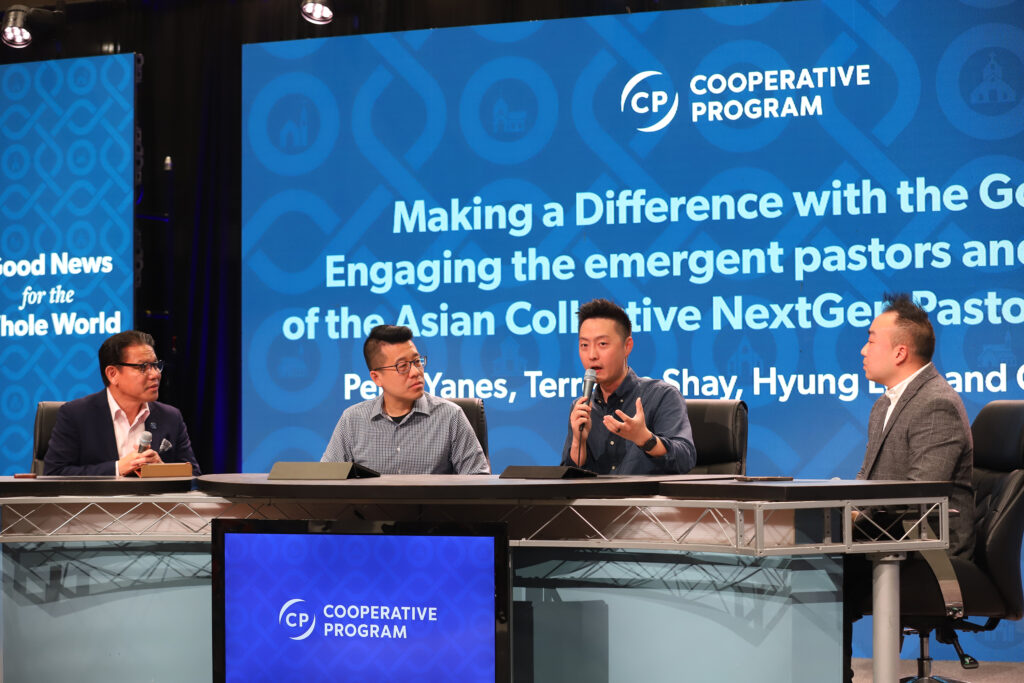
NASHVILLE (BP) – A group of leading Asian-American pastors discussed the trends and blind spots found within the ethnic group in the Southern Baptist Convention during a panel on the CP Stage during the 2023 SBC Annual Meeting in New Orleans.
One of the factors the group discussed which can be both a positive trend and a potential negative blind spot is the growing generational shift among Asian Americans.
The conversation was led by Peter Yanes, associate vice president of Asian American relations for the SBC Executive Committee, who cited statistics showing the Asian-American population continues to trend younger.
Chris Vang serves as a youth pastor at Hmong Baptist Church and is the national youth leader of the Hmong Baptist National Association. He said he has witnessed a greater emphasis on ministering to this growing younger generation in his context.
“I think a positive trend that I’ve seen in the Asian American churches, especially in my context in the Hmong churches, is just a greater need for service to the next gen, youth, young adults, college students and young leaders,” Vang said.
“I think that there is this trend of trying to build them up, disciple them, and train them to really face the challenges that our current context is facing. I think that there is this awareness to really build up a next gen ministry maybe within churches or on a national level in the Hmong churches to really serve this need.”
Hyung Lee, pastor at Living Rock Church in Pasadena, Calif., said a positive trend he is seeing in his context is a greater desire to partner among other Asian groups.
“As a Korean American I think there’s a greater desire, willingness and activity to partner not just amongst one’s own ethnic background, but also to seek to reach across ethnic lines especially to other Asian ethnic backgrounds,” Lee said.
“Even our network, we don’t just want to be Korean or Chinese … we want to just encompass as many brothers and sisters in the SBC family together to partner for the Gospel and really be a good Gospel witness in that sense.”
Terrence Shay, family ministry associate pastor at First Baptist Chinese Baptist Church in Walnut, Calif., urged churches to build up younger churchgoers.
“They are the future, but they are also the present,” Shay said. “One of the blind spots that sometimes we have is that we don’t intentionally think of ways to train them, to equip them, to platform them and to give them opportunities to lead.”
Lee explained the generational divide blind spot among Asian Americans can stem from the attitude of both the older and younger generations, but that Christ can ultimately unite.
“In terms of blind spots, it goes both ways.” Lee said.
“I guess for me just kind of observing … the older generation has a hard time letting go, allowing the kids to grow up. It’s kind of the Genesis 2 leaving and cleaving, and you see those tensions.
“For those of us who are younger, the issue really is honoring our parents, so commandment five. And even though we are an adult, we’re still kids to the older generation, and that’s not always bad to understand that. Honoring doesn’t mean you’re always going to obey and do everything they say because you’re an adult, but you still are called to honor and to disagree well.
“Sometimes the older generation wants to focus on ‘you’re Korean you’ve got to do Korean things or Hmong or Chinese.’ Those of us who are younger we flip it to say, ‘Well I’m going to be Asian American.’ But as believers, there can be a little theological drift of pragmatism and all you focus on is being Asian American, rather than I’m in Christ first before that.”
The full panel discussion can be viewed on the Cooperative Program YouTube page.
















